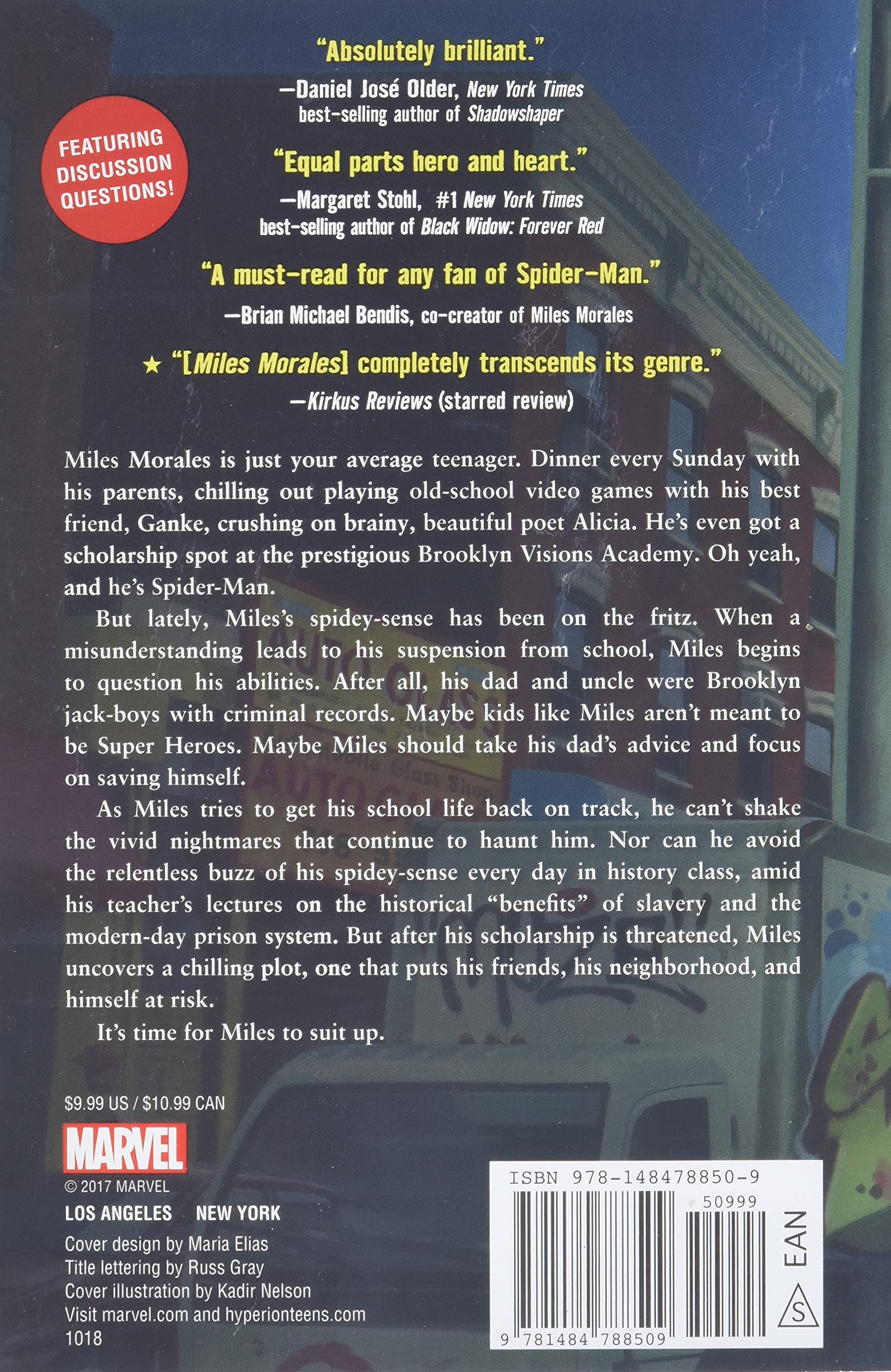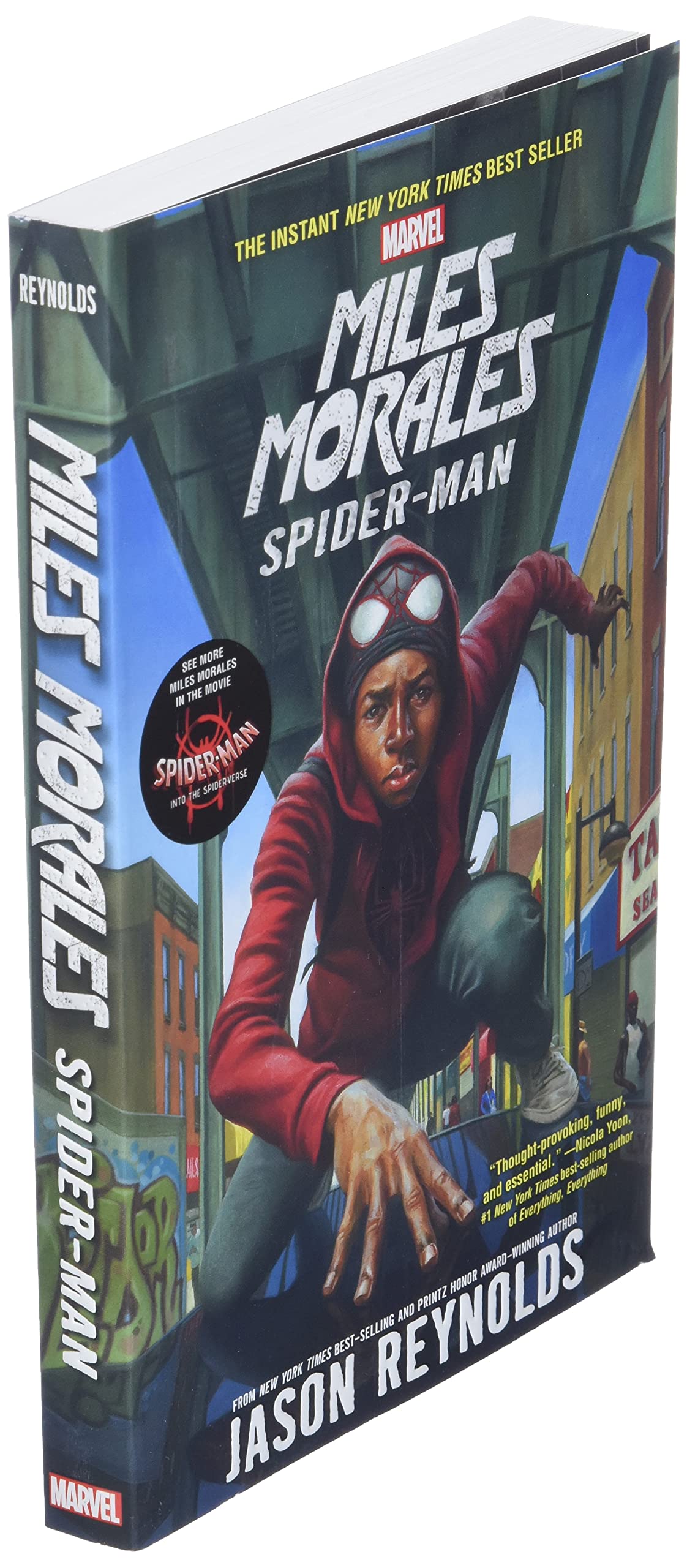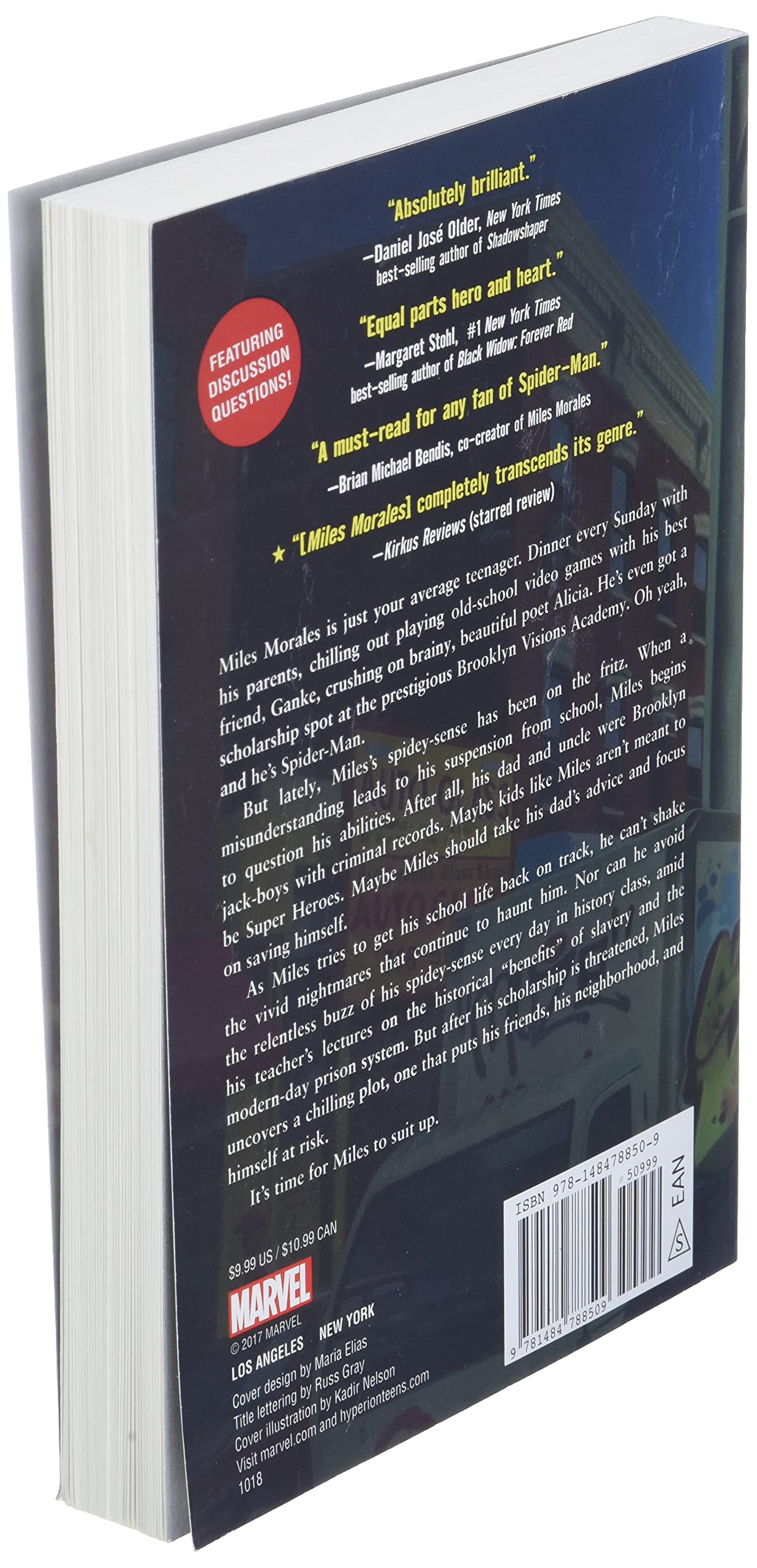Desert Online General Trading LLC
Dubai, United Arab Emirates








Full description not available




T**3
Fantastic read
Things I loved about this book: The Sijos, Jason Reynolds' ability to add mundane details into his stories and normalize characters, the very present parents, the rich and detailed side characters.Things I'm struggling with: This story, is obviously, about Spiderman. Throughout the story there is a build up to the battle scene, with Miles' Spidey sense alerting him and the way too evil history teacher. It felt like all of this build up happened and then the battle scene was 10 pages long and then it was over.However, the more I think about this, the more I think that it's done this way on purpose. Being Spiderman is just one part of Miles. He is also a son, and a friend, and a student, and a teenage boy trying to navigate his crush. This story tells one small period of time in his life. Once he has defeated the villain, he still has real life demons to answer to and problems of racism and discrimination that cannot be as easily defeated as the larger-than-life villain.So while this was unsettling to me when I read it, it forced me ask myself a lot of questions and grapple with why the story was told this way and the answers make the grappling worth it.tl;dr Jason Reynolds is masterful in his story telling. This is exactly the story Donald Glover was talking about years ago. Spiderman is just a normal, smart black kid from Brooklyn.
R**D
One of the Best Miles Morales Stories!
Jason Reynolds’ “Miles Morales: Spider-Man” is the first solo Miles Morales story written by someone other than character creator Brian Michael Bendis and it easily surpasses expectations. Reynolds grounds his story in Miles’ relationship with his parents and friends, really focusing on their role in shaping him as well as the role of his home of Brooklyn (a location that Reynolds focuses on in his other books as well). The recurring themes of family, the long shadows of the past, and the precarious nature of opportunity shape the trajectory of the story.As much as Miles struggles to balance his personal life with his life as Spider-Man, he struggles far more to live up to the expectations of his parents and his community. Things take a turn as Miles begins clashing with a teacher who seems to have a grudge against him. This same teacher, Mr. Chamberlain, acts as a Southern apologist, arguing in favor of the Confederacy during the Civil War, suggesting that slavery was a net positive for the country, and citing the punishment clause of the Thirteenth Amendment to argue that slavery continues to benefit the United States. This, coupled with Miles’ strange dreams about a cabal of men who secretly negate the hopes of young people like Miles—ensuring that their victims will eventually end up in the prison industrial complex—tap into current events such as the recent clashes over memorials to the treasonous acts of the Civil War South and Ava DuVernay’s documentary, “13th.” These dreams offer clues to the climactic battle, which, though Reynolds assures his readers is real, still rings with the weight of allegory and metaphor. As exciting as the battle is, Reynolds’ focus on the world around Miles elevates this novel beyond a basic super hero story.In focusing on Miles’ relationships and his experience with his community, Reynolds tells a story with which any reader can relate. Miles’ sudden discovery of a cousin, the son of his Uncle Aaron (once the supervillain known as the Prowler), offers a mirror through which Miles can see the effects of a system designed to limit opportunities for people of color or those who lack wealth. This real-world commentary makes this one of the strongest Miles Morales stories, particularly in light of the controversy around 2016’s “Spider-Man” #2 trying to simultaneously engage with and avoid the issue of race. It also sets a high bar for Bryan Edward Hill, who will pen the first solo Miles Morales comics story in August 2018’s “Spider-Man Annual” #1. Though Marvel Press intends this young adult novel for grades 7 and up, it should be accessible to readers as young as 10 and as old as the oldest comic book fans.
J**E
This book is a wonderful Spider-Man novel
This book is a wonderful Spider-Man novel. It combines a story about a young man trying to find his way in the world, rising above what others expect of him due to his family history with that of a superhero struggling to weigh the benefits of saving others or protecting himself. It was a complicated book for me at times that made me want to keep pushing through to find resolution. I wanted this book to be good for an upper elementary audience, but I think it is truly best for 6th and up. It is labeled YA and while I've seen reading level listed as 8 and up, I'm not sure it is a good match for that young. I can see adult Marvel fans loving this book, too. Hoping Jason Reynolds writes more Spider-Man stories.
C**Y
Inspiring reluctant readers with a great story
I got this as a gift for my son. Although he is smart and capable and hardworking, he deals with multiple learning disabilities that make reading more of a chore than a joy. I was a little nervous about giving him a book for these reasons, but he’s crazy for all things Miles Morales, and I figured it would be worth a try. I’ve never seen him pick up a book and finish it so quick. There was a light in his face and his eyes as he told me all the details of the story and how much he liked it. I’m so glad I chose this book and recommend it.
L**R
More Miles than Spider-Man
“Miles Morales: Spider-Man” by Jason Reynolds is an exploration of the forces that can hinder those born with disadvantages from being successful. These forces take on the appearances of something supernatural but represent something very real. I was expecting to read a simple superhero adventure and received something a bit different.Reynolds’ descriptions of life in New York City are very realistic. He adds to this vivid environment the struggles of a young person of color. The superhero action takes a back seat for most of the book. This is a story about Miles more than Spider-Man.This book is very good but I think the story needed to define the villain better. I know that Miles and Ganke live in the magical Marvel Universe but they seemed to accept the strange happenings with too little questioning. Maybe a sequel could help to shed light on this evil menace.